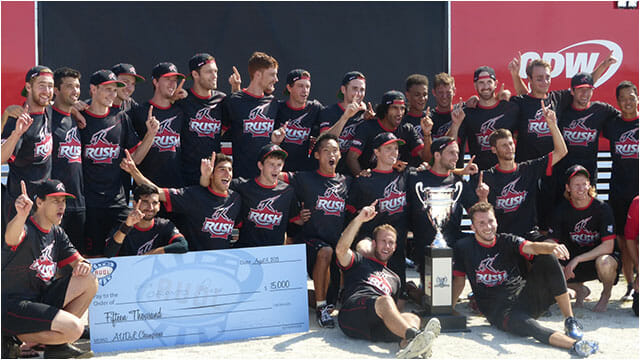November 27, 2013 by Sean Childers in News with 7 comments
The AUDL announced on Tuesday that Toronto would be hosting the 2014 Championship Weekend on July 26th and 27th. Along with the World Club Championships — which come one week later (August 2nd-9th), the AUDL Championship Wekeend becomes one of the first marquee events to land on the increasingly-busy (and seemingly compressed) summer club schedule.
In some respects, the AUDL had little choice about where to place the 2014 game. Attendance league wide, including at the Championship Weekend in Chicago, was underwhelming in 2013 and lagged behind rival MLU’s figures. The major exception was in Toronto, which routinely drew in the 1-2,000 fan range, including 2,400 fans during the top-attended game. With the AUDL seeking to bring in sponsorship partners and more media coverage, doubling down on a known quantity and fanbase was a safe, smart move.
The decision hands the defending champions, the Toronto Rush, a significant home field advantage. The undefeated Rush were largely unchallenged when they played at home in 2013, facing resistance only once they played in the Championship Weekend semifinals and finals (the 2013 playoffs were held in Chicago). Midwest favorites like the Chicago Wildfire and the Madison Radicals could be further disadvantaged by the Toronto selection. And while a hometown win will be great for Rush fans, there is also the risk that a blow-out win attracts less fan interest.
**Disclaimer: The author of this piece played with the AUDL’s New York Empire in the 2013 season.
The date also carries some meaning. The AUDL avoided one potential conflict (the World Club Championships) but introduced another by scheduling their championship on the same weekend as the New Jersey-based Wildwood Beach Ultimate Tournament. That tournament is unlikely to create conflicts with Midwest, West, or Canadian teams — or even with dedicated, elite professional players that view beach Ultimate more casually.
But it could be a different story for the East Coast teams and their fans, as Wildwood traditionally draws thousands of players from New York, New Jersey, Philadelphia, and Washington D.C. The Philadelphia Phoenix, a playoff team in the weaker AUDL Eastern division last season, overlapped players with the club team formerly known as Heva Havas and that group of players was one of just a few who disappointingly pointed out the conflict on Twitter.
Some New York Empire players also questioned the wisdom of the move:
@Ulti_world @theAUDL @TorontoRush That’s Wildwood weekend…
— Joe Ouellette (@JoeOuellette14) November 27, 2013
@bawerbuch @Ulti_world @theAUDL @TorontoRush Yeah and even people who would’ve live streamed the games any other weekend…
— Joe Ouellette (@JoeOuellette14) November 27, 2013
The date also ends some quiet speculation (perhaps mere hoping) we had heard the AUDL would move their season earlier, perhaps closer to the current MLU season, in order to reduce player conflicts with the USAU Triple Crown Tour. Tim DeByl, owner of the Madison Radicals, told Ultiworld that the league was still experimenting with different ideas and decided to shorten the season somewhat for 2014.
“We decided to shorten the season to 14 games this year to make sure it would be completed prior to Worlds,” DeByl said. “In general we believe a longer season will be necessary at some point in the future to allow teams to increase revenue. We still consider this league to very much be in the experimental stages, and so we will continue to try new things until we find a season schedule that works best for fans, owners, and players.”
The last remaining question is what type of format the AUDL might put in place with teams in three separate conferences. In 2013, two teams qualified from each conference and played semifinals on Saturday before finals on Sunday of the Championship Weekend. In 2014, that precise format would be unworkable.
The league will want to balance the cost of flying in and hosting teams (a significant expense) with the goal of keeping average teams playoff-eligible for as long as possible during the regular season. Having too many teams or games in Toronto also detracts from the one game per day style that the professional leagues prefer.
DeByl told us that the exact format had yet to be approved by the AUDL leadership. One possibility is a model similar to the 2013 setup, with local playoff games with the winning teams advancing to Toronto. DeByl said this could include one qualifier from each division and the additional qualifier coming from a Northeast vs. Midwest crossover game (the second seeded team in those two divisions would play each other for the final Toronto spot). Another potential setup could have two teams qualify from each division, but have two of the three division winners receive a bye into the semifinals. Keep an eye out: with no obvious setup, the format may become a hot topic and talking point for teams late in the 2014 AUDL regular season.
